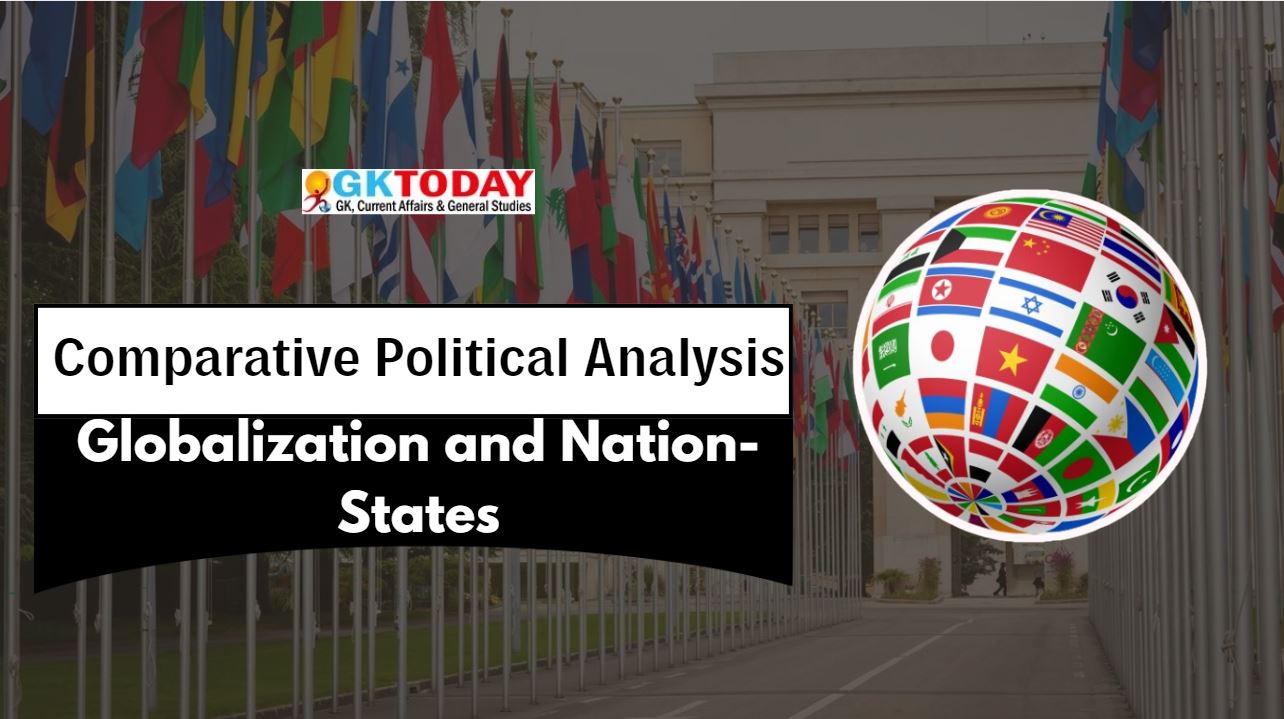Globalization and Nation-States – UGC-NTA NET Political Science
Globalization is a multifaceted phenomenon that affects nation-states in various ways. It represents the increasing interconnectedness and interdependence of countries across economic, political, cultural, and technological dimensions.
Definition of Globalization
Globalization refers to the process by which countries become more interconnected and interdependent. This process encompasses several dimensions:
- Economic
- Political
- Cultural
- Technological
Each dimension plays role in shaping the global landscape.
Dimensions of Globalization
Economic Globalization
Economic globalization involves the expansion of international trade and investment. Key features include:
- Rise of multinational corporations (MNCs) that operate across borders.
- Development of global supply chains and outsourcing practices.
For instance, companies like Apple source components from various countries, illustrating the interdependence of global economies.
Political Globalization
Political globalization refers to the spread of political ideas and norms. Notable aspects include:
- Influence of international organisations such as the UN, WTO, and IMF.
- Promotion of democracy and human rights globally.
These organisations often shape national policies, pushing states towards common standards.
Cultural Globalization
Cultural globalization describes the global dissemination of cultural products. It involves:
- Spread of media and fashion across borders.
- Hybridisation of cultures, which can lead to the loss of local identities.
For example, the global popularity of Hollywood films influences local cinema industries worldwide.
Technological Globalization
Technological globalization refers to advances in communication and transportation. Key points include:
- Development of the internet and digital connectivity.
- Improvements in transportation facilitating global trade.
These advancements have transformed how states interact and conduct business.
Impact of Globalization on Nation-States
Globalization has deep effects on nation-states, influencing their sovereignty, economic policies, cultural identities, and political power.
Sovereignty
Globalisation challenges state sovereignty. Key issues include:
- Erosion of control over borders and domestic policies.
- Increased influence of global governance structures.
For example, the European Union requires member states to adhere to shared regulations, impacting national sovereignty.
Economic Policy
Global economic standards exert pressure on national policies. Notable effects include:
- Adoption of austerity measures and deregulation in response to global financial trends.
- Influence of global financial markets on domestic economies.
Countries often adjust policies to attract foreign investment, reflecting global economic pressures.
Cultural Identity
Globalization creates tension between global culture and local traditions. Key points include:
- Rise of nationalism as a reaction to cultural homogenisation.
- Efforts to preserve local identities against global influences.
The backlash against globalisation can be seen in movements advocating for local traditions and customs.
Political Power
The political landscape is shifting due to globalization. Important aspects include:
- Power dynamics shifting from nation-states to supranational entities.
- Increased role of non-state actors such as NGOs and transnational corporations.
These entities often have influence over global issues, sometimes overshadowing traditional state power.
Theoretical Perspectives
Various theoretical frameworks help analyse the relationship between globalization and nation-states.
Realism
Realism emphasises a state-centric view of international relations. Key points include:
- States are the primary actors in global politics.
- Globalization is viewed as a challenge to state power.
Realists argue that states must prioritise their sovereignty and security in a globalised world.
Liberalism
Liberalism advocates for the benefits of globalization. Important aspects include:
- Promotion of cooperation among states.
- Role of international institutions in mitigating conflicts.
Liberals believe that globalisation can lead to peace and prosperity through collaboration.
Constructivism
Constructivism focuses on social constructs of identities and norms. Key points include:
- Globalization shapes state behaviour and identity.
- Emphasis on the importance of ideas and social interactions.
This perspective marks how global norms influence national policies.
Case Studies
Examining specific case studies provides insight into the effects of globalization on nation-states.
European Union (EU)
The EU exemplifies regional integration affecting national sovereignty. Key features include:
- Shared policies and regulations among member states.
- Impact on trade, immigration, and environmental standards.
Member states often must align national laws with EU directives, demonstrating the trade-off between sovereignty and cooperation.
NAFTA/USMCA
The North American Free Trade Agreement (NAFTA), now the United States-Mexico-Canada Agreement (USMCA), illustrates the impact on trade relations. Key aspects include:
- Reduction of trade barriers among member countries.
- Influence on domestic economic policies in North America.
These agreements have reshaped economic interactions and policies within the region.
Global Health Issues
The COVID-19 pandemic puts stress on the need for international cooperation. Key points include:
- Challenges faced by nation-states in managing global health crises.
- Importance of collaborative efforts in vaccine distribution and public health measures.
The pandemic brought into light the limitations of national responses in a globalised context.
Challenges to Nation-States
Globalization presents several challenges to nation-states.
Transnational Issues
Issues such as climate change, terrorism, and migration require collective action. Key points include:
- National governments must collaborate to address these challenges.
- Failure to cooperate can exacerbate global problems.
For instance, climate change necessitates international agreements like the Paris Agreement.
Economic Disparities
Globalization can worsen inequalities within and between states. Important aspects include:
- Wealth concentration in developed countries.
- Marginalisation of less developed nations.
This disparity can lead to social unrest and political instability.
Nationalism and Populism
There has been a resurgence of nationalist movements in response to globalization. Key points include:
- Political backlash against perceived loss of sovereignty.
- Nationalist leaders often capitalise on fears of cultural erosion.
Movements in countries like the UK and the US illustrate this trend.
Future of Nation-States in a Globalized World
The future of nation-states may involve redefined roles in global governance. Key considerations include:
- Balancing national interests with global responsibilities.
- Adapting to technological advancements that shape state interactions.
As the world becomes more interconnected, the role of nation-states will continue to evolve.


